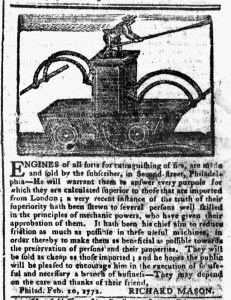What was advertised in a colonial American newspaper 250 years ago today?

“ENGINES of all sorts for extinguishing of fire.”
Richard Mason constructed and sold “ENGINES of all sorts for extinguishing of fire” at his workshop in Philadelphia in the early 1770s. In an advertisement in the Pennsylvania Chronicle, he advised the public that he designed and built his engines “to answer every purpose for which they are calculated superior to those that are imported from London.” Yet he did not expect readers simply to take his word for it. Instead, he confided that “a very recent instance of the truth of their superiority hath been shewn to several persons well skilled in the principles of mechanic powers, who have given their approbation of them.”
To that end, Mason declared, “It hath been his chief aim to reduce friction as much as possible in these useful machines, in order thereby to make them as beneficial as possible towards the preservation of the persons and their properties.” Reducing friction mattered because colonizers pumped these engines by hand after rolling them to the location of a fire. An image that accompanied Mason’s advertisement depicted an engine shooting a stream of water at an unseen fire, but did not fully capture the number of people and the amount of labor required to operate it. The wooden engine consisted of a pump enclosed within a tower mounted on a chassis. Handles on either side of the tower worked the pump. A leather hose fed the pump with water via a connection on the chassis. Pumping the engine forced a stream of water to spray from an inflexible metal tube attached to the top of the tower. As others worked the pump, an operator standing atop the tower manipulated the position of that tube, pointing it in the right direction and adjusting its position, in an effort to douse the fire.
Fire constituted a significant hazard in cities like Philadelphia with so many buildings made of wood crowded closely together. Just a few years after Mason published his advertisement, a fire destroyed a large portion of New York. Municipal fire departments did not yet exist. Instead, colonizers formed their own companies. Mason sought customers for his “ENGINES of all sorts for extinguishing of fire” among his fellow residents of Philadelphia rather than the local government.
Watch a brigade operate a replica of an eighteenth-century fire engine at Colonial Williamsburg.

